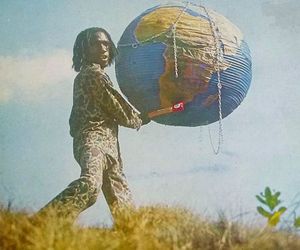Keith Mlevhu
| Keith Mlevhu | |
|---|---|
 | |
| Background information | |
| Birth name | Keith Shem Michael Mlevhu |
| Born | 14 September 1950 Chingola, Zambia |
| Died | March 5, 1988 (aged 37) Luanshya, Zambia |
| Genres | Zamrock |
| Associated acts | Rikki Ililonga, Paul Ngozi, The Witch |
Keith Shem Michael Mlevhu (14 September 1950 - 5 March 1988) was a Zambian multi-instrumentalist musician, popularly known for his independence song, Ubuntungwa, which was part of his 1976 album Love and Freedom.
Early life
Mlevhu was born on 14 September 1950 in the mining town of Chingola.
Music career
He started his music career from the time he was still a juvenile and played in a number notable music bands in his formative years on the Copperbelt. He started with Dyna-Magic as an instruments handy boy in his early teens before graduating into a sensational guitarist for the same band. Keith later on pioneered and led several other pop groups, namely: The New Orleans, Mac Beth, The Rave Five, The End and The Aqualung.[1]
As a young musician in 1969, Mlevhu led The Rave Five into winning a contest for bands dubbed ‘The Mini Woodstock’ held at Lusaka Showgrounds. The following year, he led another youthful outfit, ‘The End’ on a six-month tour of Congo-Kinshasa where the band was resident at a Lubumbashi club. When ‘The End’ returned home they split with Mlevhu forming a new band, The Aqualung.
It was after the disbanding of Aqualung that he pursued the new three-year diploma course in music at Evelyn Hone College in Lusaka where, because of his brilliance and competence, he was retained as a lecturer. During his lecturing days, Keith found time to enter the Zambia Broadcasting Services studios for recordings. His very first piece to hit the airwaves was 'You, Me and the Other Fellow' in 1975. This song and its accompanying video were done as a political advert calling for love and unity in the nation. The same year his debut solo album, ‘Banafimbusa’ was released.[1]
In 1976, Mlevhu travelled to Nairobi under the sponsorship of Teal Record Company to record his second album Love and Freedom. Recorded at Sapra Studios, the album was still on the Mac Bullet label and set new record production standards. This was the first Zambian album to be presented in a full colour cover sleeve jacket. On the cover design, Mlevhu, with plaited locks, is depicted adorned in military camouflage breaking the chains strapped around the globe, his axe deliberately aimed at Southern Africa, where Zimbabwe, Namibia, Angola, Mozambique and South Africa were still struggling for their freedom. The album design was accredited to the artiste himself.[2]
Discography
Albums
- Banafimbusa (1975)
- Love and Freedom (1976)
- Through Fire To Heaven (1977)
- Touch of the Sun (1979)
Compilations
Death
Mlevhu died on 5 March 1988 in Luanshya on the Copperbelt.
See also
References
<templatestyles src="Reflist/styles.css" />
- ↑ 1.0 1.1 Ubuntungwa: remembering Keith Mlevu, The Post, 5 December 2014
- ↑ Zambian Music Legends by Leonard Koloko